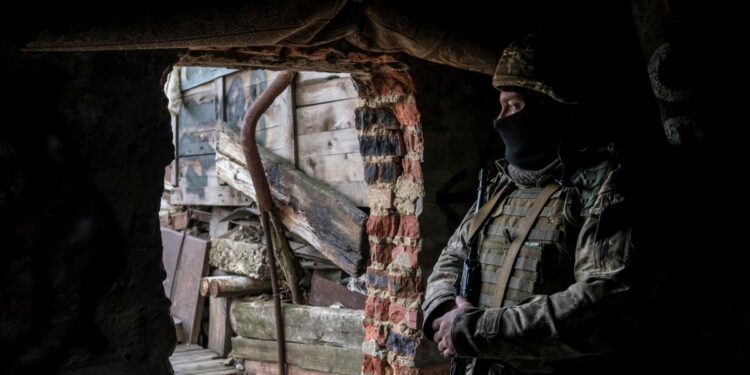Nord Stream 2 (NS2), Europe’s most contentious infrastructure project, seems to have survived the Putin-Biden teleconference and is likely to be approved by the German regulator. This outcome may be the purpose of the recent Russian troop mobilization. Europe’s and Germany’s dependence on Russian gas deepens and may appear irreversible, with long-term geo-strategic consequences the U.S. leaders and planners should take into account. Yet, Russia’s clash with the West would incur very high costs on the Kremlin.
The Russian invasion of Ukraine’s eastern and southern regions: Kharkiv, Kyiv, Kherson, Mykolaiv, and Odesa is avoided – for now. Russian troop mobilizations since last spring triggered alarm bells in Washington and Brussels, raising the specter of invasion and adding yet another layer of complexity to Europe’s energy crisis.
In leaked documents, U.S. intelligence experts warned European allies of a possible 175,000 strong multi-front offensive against Ukraine set to take place in the early months of next year. This may not have been enough for a full-scale invasion and occupation of 2/3 of Ukraine.
The military buildup reached a breaking point this week as the number of Russian forces within striking distance of Ukraine surpassed 100,000 troops, prompting President Joe Biden and President Vladimir Putin to confer. In the two-hour virtual meeting, President Biden pledged to impose sanctions and military support for Ukraine on levels far exceeding those in response to Russia’s 2014 seizure of Crimea.
In addition to threats of boosting ‘lethal aid’ for Ukraine’s military by some $300 million, Biden reportedly warned of policy actions including:
· Restricting investors’ ability to buy Russian debt on the secondary market
· Targeting Russia’s Direct Investment Fund (sovereign wealth fund)
· Placing curbs on Putin’s inner circle – freezing of bank accounts and imposing travel restrictions
· Disconnecting Russia from the SWIFT international payment system used by banks around the world
· Halting the certification of Nord Stream 2
For its part, the Kremlin vociferously denied harboring any plans to invade Ukraine. Instead, Putin blamed NATO for the rise in tensions citing its “dangerous efforts” to expand ties with Kyiv and increase military capabilities aimed at Russia. Putin again demanded legal guarantees that Ukraine not be included in NATO and that offensive weapons, such as nuclear capable missile systems with short flight time to Moscow, not be stationed along the Russian border. Biden reportedly stood his ground and offered no promises to limit NATO’s eastward expansion, but teams on both sides would discuss Russian concerns, and NATO European allies would participate in the talks.
Thus far, there have been no concrete signs of de-escalation. But Nord Stream 2 could offer the leverage the West needs to ensure a Russian draw-down.
That’s because energy security cuts both ways. Gazprom – the state-controlled Russian gas monopoly behind NS2 – provides 35% of Europe’s natural gas imports. When fully operational, NS2 boasts a nameplate capacity of 55 billion cubic meters (bcm).
The $11 bn dollar project directly connects gas fields in Russia to energy-hungry Germany via undersea pipeline, circumventing Ukraine – the current gatekeeper of Russian gas into Europe. Nord Stream and Nord Stream 2, together with TurkStream, are part of Russia’s larger strategy to envelop Europe’s North and South in a pipeline pincer movement and increase diversification of its supply routes to top customers in Europe.
These diversification efforts pose a serious risk to the economy of Ukraine by “cutting out the middleman.” Today the country stands to lose $3 billion on transit fees if Nord Stream 2 is approved, equivalent to nearly 2% of the country’s GDP. The pipeline alone will meet 15% of Europe’s natural gas import needs once fully operational.
American and European experts decry the NS2 infrastructure project as an energy security threat to the EU – they say anything that makes Europe more dependent on Russian energy carries an implicit threat. The Kremlin has demonstrated time and time again its willingness to use energy as a geopolitical cudgel, its most recent offense being the refusal to send extra gas to Europe during a historic energy crunch.
This was done to put upward pressure on already sky-high natural gas prices and provide a reminder to Europe of the power that Moscow still holds over Brussels. Kudos to Germany’s new Chancellor Olaf Scholz, who vowed to keep NS2 shut down in the event of a Russian invasion of Ukraine.
But keep in mind that Russia has a GDP smaller than that of Italy. Inflation broke 8% in November. Omicron variant fears are slowing momentum on an otherwise strong recovery in energy prices. That is to say, Moscow desperately needs the billions in annual revenue that NS2 is designed to bring. While Putin certainly holds dangerous irridentist views towards Ukraine – including denying it’s right to statehood, proclaiming that Ukrainians and Russians are one nation, and waiving the Russian imperial control over some Ukrainian territories 100 years ago and more, – Putin is not irrational enough to kill the future golden goose and suffer massive economic sanctions.
So long as Nord Stream 2 remains in play, the West holds considerable leverage over Putin – not the other way around.
Finally, a war in Ukraine and massive Western sanctions will make Russia intolerably dependent on China. A position, Moscow, valuing above all its autonomy of action in international politics, would try avoiding at all costs.
With assistance from James Grant











